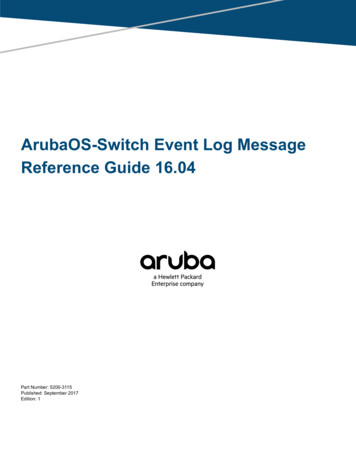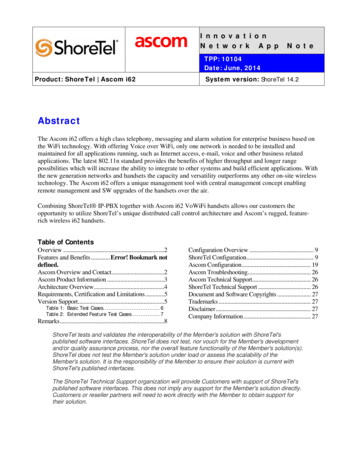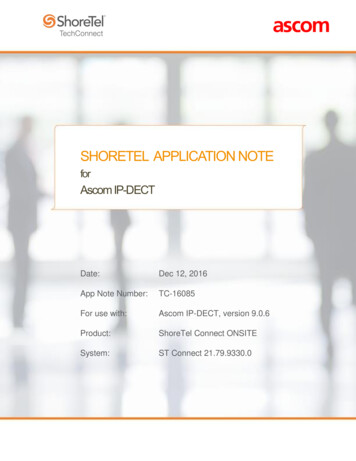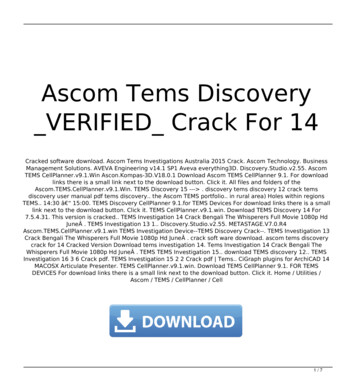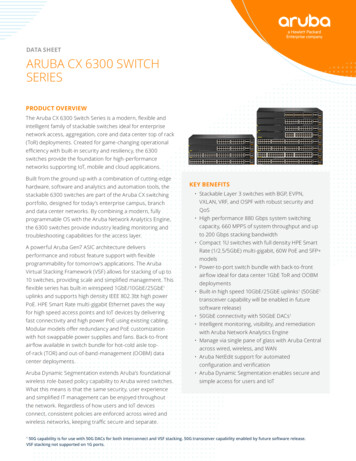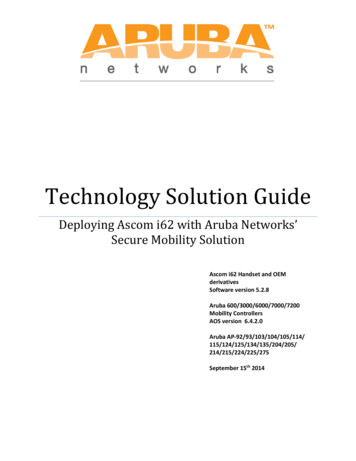
Transcription
Technology Solution GuideDeploying Ascom i62 with Aruba Networks’Secure Mobility SolutionAscom i62 Handset and OEMderivativesSoftware version 5.2.8Aruba 600/3000/6000/7000/7200Mobility ControllersAOS version 6.4.2.0Aruba /205/214/215/224/225/275September 15th 2014
WARRANTY DISCLAIMERTHE FOLLOWING DOCUMENT, AND THE INFORMATION CONTAINED HEREIN IS PROVIDED ONAN "AS IS" BASIS. ARUBA MAKES NO REPRESENTATIONS, WARRANTIES, CONDITIONS ORGUARANTEES AS TO THE USEFULNESS, QUALITY, SUITABILITY, TRUTH, ACCURACY ORCOMPLETENESS OF THISDOCUMENT AND THE INFORMATION CONTAINED IN THIS DOCUMENT.DISCLAIMER OF LIABILITYAruba Networks, Inc. disclaims liability for any personal injury, property or other damages ofany nature whatsoever, whether special, indirect, consequential or compensatory, directly orindirectly resulting from the certification program or the acts or omissions of any company ortechnology that has been certified by Aruba Networks.Certification does not mean that the company is a subcontractor or under the technical controlor direction of Aruba Networks. In conducting the certification program Aruba Networks is notundertaking to render professional or other services for or on behalf of any person or entity.Deploying Ascom’s i62 VoWi‐Fi Handset with Aruba Networks’ Secure Mobility Solution1
Table of ContentsIntroduction . 3Solution Components . 3Aruba Campus WLAN Solution . 3Ascom Solution . 4ArubaEdge Solution Qualification . 6Qualification Objective . 6Network Topology . 6Test Methodology . 8Summary Test Results . 8Know Limitations . 10Conclusion . 10Appendix 1 . 11General settings (SSID, Radio and QoS) . 11Encryption and Authentication Settings . 14Ascom i62 Setting Summary . 17APPENDIX B . 19Test Summary . 19Aruba Test Configuration File . 20Deploying Ascom’s i62 VoWi‐Fi Handset with Aruba Networks’ Secure Mobility Solution2
IntroductionThis document describes the steps and guidelines necessary to configure Aruba’s wireless LAN (AOSversion. 6.4.2.0) infrastructure to work interoperable with Ascom’s i62 handsets.The guide is intended to be used in conjunction with Aruba and Ascom configuration guides. Pleasecontact the respective company’s sales engineering or support groups should additional information berequired.Solution Verified:Ascom PhonesAruba Product:Aruba Campus WLAN Solution OS version 6.4.x.xPartner Solution Tested:Ascom i62 Handset; Software version 5.2.8Solution ComponentsAruba Campus WLAN SolutionSecure and reliable mobility is the responsibility of the enterprise network, which must support a widerange of converged clients over wireless, wired, and remote access networks. Laptops and smartphonesare capable of simultaneously running voice, data, and now video applications, an operating model thatbreaks traditional dedicated VLAN and SSID architectures. Delivering the quality of service (QoS),bandwidth, and management tools necessary to accommodate these devices on a grand scale – within acampus environment, to users on the road, and in branch offices – requires a specially tailored systemdesign.Aruba’s unique application and device fingerprinting enable the system to detect the types of trafficflows, and the devices from which they originate. The network can then be dynamically conditioned todeliver QoS ‐ on an application‐by‐application, device‐by‐device basis ‐ as needed to ensure highlyreliable application delivery. Aruba’s integrated policy enforcement firewall isolates applications fromone another to essentially create multiple dedicated virtual networks, and then allocates the necessarybandwidth for each user and application.To ensure reliable application delivery in changing RF environments, Aruba’s Adaptive RadioManagement (ARM) technology forces client devices to shift away from the noisy 2.4GHz band to thequieter 5GHz band, adjusts radio power levels to blanket coverage areas, load balance by shifting clientsbetween access points, and even allocates airtime based on the capabilities of each client device. Theresult is a superb user experience without any user involvement.These services are complemented by security systems that ensure the integrity of the network. Roguedetection, wireless intrusion and prevention, access control, remote site VPN, content security scanning,end‐to‐end data encryption, and other services protect the network and users at all times.Deploying Ascom’s i62 VoWi‐Fi Handset with Aruba Networks’ Secure Mobility Solution3
Aruba’s extensive portfolio of campus, branch/teleworker, and mobile solutions simplify operations andsecure access to unified communications applications and services ‐ regardless of the user's device,location, or network. This dramatically improves productivity, lowering capital and operational costswhile providing a superior uninterrupted user experience.Ascom SolutionThe Ascom i62 offers a sophisticated telephony, messaging and alarm solution for enterprise businessbased on Wi‐Fi technology. By offering Voice Over Wi‐Fi, only one network needs to be installed andmaintained for all applications including Internet access, e‐mail, voice and other business relatedapplications.The latest 802.11n and 802.11ac standards provide the benefits of higher throughput and longer range,increasing the ability to integrate with other systems and build efficient applications. With the newgeneration networks and handsets the capacity and versatility outperforms any other on‐site wirelesstechnology.The Ascom i62 offers a unique management tool with central management concept enabling remotemanagement and SW upgrades of the handsets over the air.Deploying Ascom’s i62 VoWi‐Fi Handset with Aruba Networks’ Secure Mobility Solution4
Certified Product SummaryManufacturerAscom Wireless SolutionsProducts CertifiedAscom i62 and OEM derivatives Hardware Model NumbersWH1‐xxxx Software Version Numbers5.2.8RF Features Tested Radio SupportedQoS Features Supported / Tested802.11a/b/g/nWMM Powersave Features TestedU‐APSD Encryption SupportedWPA2‐PSK, PEAP‐MSCHAPv2, EAP‐TLS Encryption TestedWPA2‐PSK, PEAP‐MSCHAPv2, EAP‐TLS 802.11h SupportedYes Key Caching Support forOptimized RoamingOKC and PMKVoice Specific Features Protocols SupportedSIP‐UDP, SIP‐TCP, SIP‐TLS, H.323 Control Traffic PatternHandset to Server and vice versa Voice Traffic PatternPeer‐to‐peer (between handsets) # of Calls per AP Tested18 calls (not AP‐capacity limited)Deploying Ascom’s i62 VoWi‐Fi Handset with Aruba Networks’ Secure Mobility Solution5
ArubaEdge Solution QualificationQualification ObjectiveValidate the interoperability of the Ascom i62 with the Aruba’s wireless LAN infrastructure (version6.4.2.0).Network TopologyDeploying Ascom’s i62 VoWi‐Fi Handset with Aruba Networks’ Secure Mobility Solution6
Settings on the Aruba WLANEnable SNMP v2 on the Aruba Mobility Controller, and configure the community string as follows:The following Aruba Mobility Controller configuration settings are recommended for use withAscom i62 handsets: RF Recommended Settings for Ascomo Beacon Interval: 100mso DTIM Period: 5o WMM/ U‐APSD Enabledo 802.11d Regulatory Domain: Country specificEncryption and Authenticationo The handset and the WLAN infrastructure support and were tested with WPA/WPA2enterprise and PSK. Please refer the Aruba configuration guide for additional information onhow the SSIDs and encryption/authentication methods should be configured.Adaptive Radio Managemento Enable ARM, voice aware scanning, WMM / UAPSD, and band steering.User Roles and PoliciesThe Ascom phones support SIP and H.323. So enable the voice ACL or the SIP and H.323 ACLsAscom SettingsThe following Ascom i62 Handset configuration settings are recommended for use with Aruba MobilityControllersAscom i62 Configuration: World Mode Regulatory Domain set to World mode.IP DSCP for Voice: 0xC0 (46) – Expedited ForwardingIP DSCP for Signaling: 0x68 (26) – Assured Forwarding 31Transmit Gratuitous ARP: EnableRefer to Appendix A for additional details.Deploying Ascom’s i62 VoWi‐Fi Handset with Aruba Networks’ Secure Mobility Solution7
Test MethodologySummary Test ResultsThe features and functions listed below were assessed during interoperability testing. The test resultsare presented in the right‐most columnWLAN Controller FeaturesHigh Level FunctionalityAssociation, Open with No EncryptionAssociation, Open with Static WEP64/128ResultOKNot testedAssociation, WPA‐PSK, TKIPOKAssociation, WPA2‐PSK, TKIP / AES EncryptionOKAssociation, PEAP‐MSCHAPv2 Auth., TKIP EncryptionOKAssociation, PEAP‐MSCHAPv2 Auth., AES EncryptionOKAssociation, EAP‐TLSOKAssociation, Multiple ESSIDsOKBeacon Interval and DTIM PeriodOKPre‐authenticationN/APMKSA CachingOKWPA2‐Opportunistic/Proactive Key CachingOKWMM PrioritizationOKActive Mode (load test)OK802.11 Power‐Save ModeOK802.11e U‐APSDOK802.11e U‐APSD (load test)OKDeploying Ascom’s i62 VoWi‐Fi Handset with Aruba Networks’ Secure Mobility Solution8
RoamingHigh Level FunctionalityResultRoaming, Open with No EncryptionOK (Avg roaming time 24ms) *Roaming, WPA‐PSK, TKIP EncryptionNot testedRoaming, WPA2‐PSK, AES EncryptionOK (Avg roaming time 59ms) *Roaming, PEAP‐MSCHAPv2 Auth, AES EncryptionOK (Avg roaming time 68ms) */*** ) Stated roaming times were measured using 802.11bg (n) AP‐225. Refer to Appendix B for detailedtest records.** ) Results observed with Opportunistic Key Caching enabled. Results average 400ms withoutOpportunistic Key Caching.Deploying Ascom’s i62 VoWi‐Fi Handset with Aruba Networks’ Secure Mobility Solution9
Know Limitations‐Note that AP‐205/214/215/224/225/275 only supports DTIM 1. This will reduce the standby(idle) time from approximately 100 hours to 60 hours.‐Ascom i62 does not handle 802.11K info correctly which affects the roaming negatively.It is therefore highly recommended to configure the Aruba system not to advertise the 802.11Kcapabilities for the Ascom i62 SSID.ConclusionThe verification, including association, authentication, roaming, and load test produced very goodresults overall. Roaming times were in general good with roaming times of around 40‐60ms both whenusing WPA2‐PSK/AES and PEAP‐MSCHAPv2 (WPA2/AES).Load testing showed that more than 18 Ascom i62 Handsets could maintain a call via a single Arubaaccess point when tested both in active and U‐APSD modes. Note that 18 was the maximum number ofdevices tested and not the capacity limit.Deploying Ascom’s i62 VoWi‐Fi Handset with Aruba Networks’ Secure Mobility Solution10
Appendix 1This section includes screenshots and explanations of basic settings required to use Ascom i62 Handsetswith an Aruba 3400 Mobility Controller. Please note the security settings of each test case, as they weremodified according to needs of the test cases.The configuration file is found at the end of this appendix.General settings (SSID, Radio and QoS)Set DTIM Interval to 5 (for AP‐204/205/214/215/224/225 only value 1 is supported). This value isrecommended for maximum battery conservation without impacting call quality. Using a lower valuewill also decrease the standby time slightly.Deploying Ascom’s i62 VoWi‐Fi Handset with Aruba Networks’ Secure Mobility Solution11
Ascom recommends disabling the lowest rates and recommends that 12mbits is the lowest basic rate.Ensure that WMM and U‐APSD are enabled. To match the default values in the i62 ensure to use DSCP46 for Voice, 26 for video and 0 for best effort. It is also recommended that “Max Transmit Attempts” beset to 4.Note: To further optimize performance it is recommended that 802.11b clients be disallowed fromassociating by setting the 6 Mbps or 12Mbps as Basic Rates in the 802.11g configuration.Deploying Ascom’s i62 VoWi‐Fi Handset with Aruba Networks’ Secure Mobility Solution12
Set “Maximum Transmit Failures” to 25.“High throughput enable” enables 802.11n capabilities that are supported in combination with Openencryption and WPA2‐AES (PSK or Enterprise).Ascom does support both usage of 40MHz and Very High throughput enabled SSID including 80MHzchannels.Ascom recommends a Beacon Interval of 100ms and advertising 802.11d/h capabilities.General guidelines when deploying Ascom i62 handsets (SW version 2.5.7 or later) in 802.11a/nenvironments:1. Enabling more than 8 channels will degrade roaming performance. Ascom stronglyrecommends against going above this limit.2. Using 40 MHz channels (or “channel‐bonding”) will reduce the number of non‐DFS* channelsto two in ETSI regions (Europe). In FCC regions (North America), 40MHz is a more viable optionbecause of the availability of additional non‐DFS channels. The handset can co‐exist with40MHz stations in the same ESS.Deploying Ascom’s i62 VoWi‐Fi Handset with Aruba Networks’ Secure Mobility Solution13
3. Make sure that all non‐DFS channel are taken before resorting to DFS channels. The handsetcan cope in mixed non‐DFS and DFS environments; however, due to “unpredictability”introduced by radar detection protocols, voice quality may become distorted and roamingdelayed. Hence Ascom recommends avoiding the use of DFS channels in VoWi‐Fi deployments.*) Dynamic Frequency Selection (radar detection)Ascom recommends a Beacon Interval of 100ms and advertising 802.11d/h capabilities. For 802.11b/g/nuse only channels 1, 6 and 11. For 802.11a/n, use channels in accordance with Aruba’s guidelines and incompliance with local regulations.Encryption and Authentication SettingsWPA2‐PSK. Set the security profile to WPA2‐PSK, AES encryption.Deploying Ascom’s i62 VoWi‐Fi Handset with Aruba Networks’ Secure Mobility Solution14
Enterprise/.1X authentication.Step 1: When configuring the authentication mode using a Radius sever, the IP address and the secretmust correspond to the IP address and the credential used by the Radius server. The RADIUS servershould be added to a Server Group.Step 2: Create an 802.1X Authentication Profile.Deploying Ascom’s i62 VoWi‐Fi Handset with Aruba Networks’ Secure Mobility Solution15
Step 3: Choose the 802.1X Authentication profile created in previous step and configure theAuthentication Server group.Choose configured AAA Profile and set WPA2/AES as the security mode.See Appendix B for the controller configuration used for the certification process.Deploying Ascom’s i62 VoWi‐Fi Handset with Aruba Networks’ Secure Mobility Solution16
Ascom i62 Setting SummaryNetwork settings for WPA2‐PSKDeploying Ascom’s i62 VoWi‐Fi Handset with Aruba Networks’ Secure Mobility Solution17
Network settings for .1X authentication (PEAP‐MSCHAPv2)802.1X Authentication requires a root certificate to be uploaded to the phone by “right clicking” ‐ Editcertificates. EAP‐TLS will require both a root and a client certificate.Note that both a root and a client certificate are needed for TLS. Otherwise only a root certificate is needed.Server certificate validation can be overridden in version 4.1.12 and above per handset setting (Validate servercertificate under Network settings).Deploying Ascom’s i62 VoWi‐Fi Handset with Aruba Networks’ Secure Mobility Solution18
APPENDIX BTest SummaryDescriptionRunsTests passed24Tests Not Run11Tests fail0Test NA0Total Number of Tests35Deploying Ascom’s i62 VoWi‐Fi Handset with Aruba Networks’ Secure Mobility Solution19
Aruba Test Configuration Fileversion 6.4enable secret 6"hostname "Aruba3400"clock timezone PST ‐8location "Building1.floor1"controller config 716ip NAT pool dynamic‐srcnat 0.0.0.0 0.0.0.0ip access‐list eth validuserethaclpermit any!netservice svc‐pcoip2‐tcp tcp 4172netservice svc‐snmp‐trap udp 162netservice svc‐netbios‐dgm udp 138netservice svc‐citrix tcp 2598netservice svc‐smb‐tcp tcp 445netservice svc‐ike udp 500netservice svc‐l2tp udp 1701netservice svc‐syslog udp 514netservice svc‐dhcp udp 67 68 alg dhcpnetservice svc‐https tcp 443netservice svc‐ica tcp 1494netservice svc‐pptp tcp 1723netservice svc‐telnet tcp 23netservice svc‐http‐accl tcp 88netservice svc‐sccp tcp 2000 alg sccpnetservice svc‐sec‐papi udp 8209netservice svc‐tftp udp 69 alg tftpnetservice svc‐kerberos udp 88netservice svc‐sip‐tcp tcp 5060netservice svc‐netbios‐ssn tcp 139netservice svc‐pcoip‐udp udp 50002netservice svc‐pcoip‐tcp tcp 50002netservice svc‐pop3 tcp 110netservice svc‐adp udp 8200netservice svc‐cfgm‐tcp tcp 8211netservice svc‐noe udp 32512 alg noenetservice svc‐http‐proxy3 tcp 8888netservice svc‐lpd‐tcp tcp 631netservice svc‐msrpc‐tcp tcp 135 139netservice svc‐rtsp tcp 554 alg rtspnetservice svc‐dns udp 53 alg dnsnetservice vnc tcp 5900 5905netservice svc‐vocera udp 5002 alg voceranetservice svc‐h323‐tcp tcp 1720netservice svc‐h323‐udp udp 1718 1719netservice svc‐http tcp 80netservice svc‐nterm tcp 1026 1028netservice svc‐sip‐udp udp 5060netservice svc‐http‐proxy2 tcp 8080netservice svc‐noe‐oxo udp 5000 alg noenetservice svc‐papi udp 8211netservice svc‐ftp tcp 21 alg ftpnetservice svc‐natt udp 4500netservice svc‐svp 119 alg svpnetservice svc‐microsoft‐ds tcp 445netservice svc‐gre 47netservice svc‐smtp tcp 25netservice web tcp list "80 443"netservice svc‐smb‐udp udp 445netservice svc‐sips tcp 5061 alg sipsnetservice svc‐netbios‐ns udp 137netservice svc‐esp 50Deploying Ascom’s i62 VoWi‐Fi Handset with Aruba Networks’ Secure Mobility Solution20
netservice svc‐cups tcp 515netservice svc‐pcoip2‐udp udp 4172netservice svc‐bootp udp 67 69netservice svc‐snmp udp 161netservice svc‐v6‐dhcp udp 546 547netservice svc‐icmp 1netservice svc‐ntp udp 123netservice svc‐msrpc‐udp udp 135 139netservice svc‐ssh tcp 22netservice svc‐http‐proxy1 tcp 3128netservice svc‐v6‐icmp 58netservice svc‐lpd‐udp udp 631netservice svc‐vmware‐rdp tcp 3389netdestination6 ipv6‐reserved‐rangeinvertnetwork 2000::/3!netexthdr default!time‐range night‐hours periodicweekday 18:01 to 23:59weekday 00:00 to 07:59!time‐range weekend periodicweekend 00:00 to 23:59!time‐range working‐hours periodicweekday 08:00 to 18:00!ip access‐list session allow‐diskservicesany any svc‐netbios‐dgm permitany any svc‐netbios‐ssn permitany any svc‐microsoft‐ds permitany any svc‐netbios‐ns permit!ip access‐list session controlany any svc‐papi permitany any svc‐sec‐papi permituser any udp 68 denyany any svc‐icmp permitany any svc‐dns permitany any svc‐cfgm‐tcp permitany any svc‐adp permitany any svc‐tftp permitany any svc‐dhcp permitany any svc‐natt permit!ip access‐list session v6‐icmp‐acl!ip access‐list session apprf‐ascom‐sacl!ip access‐list session validusernetwork 169.254.0.0 255.255.0.0 any any denynetwork 127.0.0.0 255.0.0.0 any any denynetwork 224.0.0.0 240.0.0.0 any any denyhost 255.255.255.255 any any denynetwork 240.0.0.0 240.0.0.0 any any denyany any any permitipv6 host fe80:: any any denyipv6 network fc00::/7 any any permitipv6 network fe80::/64 any any permitipv6 alias ipv6‐reserved‐range any any denyipv6 any any any permit!ip access‐list session vocera‐aclany any svc‐vocera permit queue highDeploying Ascom’s i62 VoWi‐Fi Handset with Aruba Networks’ Secure Mobility Solution21
!ip access‐list session v6‐https‐acl!ip access‐list session vmware‐aclany any svc‐vmware‐rdp permit tos 46 dot1p‐priority 6any any svc‐pcoip‐tcp permit tos 46 dot1p‐priority 6any any svc‐pcoip‐udp permit tos 46 dot1p‐priority 6any any svc‐pcoip2‐tcp permit tos 46 dot1p‐priority 6any any svc‐pcoip2‐udp permit tos 46 dot1p‐priority 6!ip access‐list session apprf‐default‐vpn‐role‐sacl!ip access‐list session v6‐controlipv6 any any svc‐papi permitipv6 any any svc‐sec‐papi permitipv6 user any udp 547 denyipv6 any any svc‐v6‐icmp permitipv6 any any svc‐dns permitipv6 any any svc‐cfgm‐tcp permitipv6 any any svc‐adp permitipv6 any any svc‐tftp permitipv6 any any svc‐dhcp permitipv6 any any svc‐natt permit!ip access‐list session icmp‐aclany any svc‐icmp permit!ip access‐list session apprf‐authenticated‐sacl!ip access‐list session apprf‐stateful‐dot1x‐sacl!ip access‐list session captiveportaluser alias controller svc‐https dst‐nat 8081user any svc‐http dst‐nat 8080user any svc‐https dst‐nat 8081user any svc‐http‐proxy1 dst‐nat 8088user any svc‐http‐proxy2 dst‐nat 8088user any svc‐http‐proxy3 dst‐nat 8088!ip access‐list session v6‐dhcp‐acl!ip access‐list session allowallany any any permit!ip access‐list session v6‐dns‐acl!ip access‐list session apprf‐voice‐sacl!ip access‐list session lync‐aclany any svc‐sips permit queue high!ip access‐list session test!ip access‐list session sip‐aclany any svc‐sip‐udp permit queue highany any svc‐sip‐tcp permit queue high!ip access‐list session https‐aclany any svc‐https permit!ip access‐list session citrix‐aclany any svc‐citrix permit tos 46 dot1p‐priority 6any any svc‐ica permit tos 46 dot1p‐priority 6!ip access‐list session dns‐aclany any svc‐dns permitDeploying Ascom’s i62 VoWi‐Fi Handset with Aruba Networks’ Secure Mobility Solution22
!ip access‐list session ascomany any any permit!ip access‐list session ra‐guardipv6 user any icmpv6 rtr‐adv deny!ip access‐list session allow‐printservicesany any svc‐cups permitany any svc‐lpd‐tcp permitany any svc‐lpd‐udp permit!ip access‐list session logon‐controluser any udp 68 denyany any svc‐icmp permitany any svc‐dns permitany any svc‐dhcp permitany any svc‐natt permitany network 169.254.0.0 255.255.0.0 any denyany network 240.0.0.0 240.0.0.0 any deny!ip access‐list session vpnlogonuser any svc‐ike permituser any svc‐esp permitany any svc‐l2tp permitany any svc‐pptp permitany any svc‐gre permit!ip access‐list session srcnatuser any any src‐nat!ip access‐list session skinny‐aclany any svc‐sccp permit queue high!ip access‐list session tftp‐aclany any svc‐tftp permit!ip access‐list session v6‐allowall!ip access‐list session apprf‐cpbase‐sacl!ip access‐list session cplogoutuser alias controller svc‐https dst‐nat 8081!ip access‐list session apprf‐default‐via‐role‐sacl!ip access‐list session dhcp‐aclany any svc‐dhcp permit!ip access‐list session http‐aclany any svc‐http permit!ip access‐list session v6‐http‐acl!ip access‐list session captiveportal6ipv6 user alias controller6 svc‐https captiveipv6 user any svc‐http captiveipv6 user any svc‐https captiveipv6 user any svc‐http‐proxy1 captiveipv6 user any svc‐http‐proxy2 captiveipv6 user any svc‐http‐proxy3 captive!ip access‐list session apprf‐guest‐sacl!ip access‐list session ap‐uplink‐aclany any udp 68 permitDeploying Ascom’s i62 VoWi‐Fi Handset with Aruba Networks’ Secure Mobility Solution23
any any svc‐icmp permitany host 224.0.0.251 udp 5353 permit!ip access‐list session ap‐aclany any svc‐gre permitany any svc‐syslog permitany user svc‐snmp permituser any svc‐http permituser any svc‐http‐accl permituser any svc‐smb‐tcp permituser any svc‐msrpc‐tcp permituser any svc‐snmp‐trap permituser any svc‐ntp permituser alias controller svc‐ftp permit!ip access‐list session svp‐aclany any svc‐svp permit queue highuser host 224.0.1.116 any permit!ip access‐list session noe‐aclany any svc‐noe permit queue high!ip access‐list session global‐sacl!ip access‐list session v6‐ap‐aclipv6 any any svc‐gre permitipv6 any any svc‐syslog permitipv6 any user svc‐snmp permitipv6 user any svc‐snmp‐trap permitipv6 user any svc‐ntp permitipv6 user alias controller6 svc‐ftp permit!ip access‐list session h323‐aclany any svc‐h323‐tcp permit queue highany any svc‐h323‐udp permit queue high!ip access‐list session v6‐logon‐controlipv6 any network fc00::/7 any permitipv6 any network fe80::/64 any permitipv6 any alias ipv6‐reserved‐range any deny!vpn‐dialer default‐dialerike authentication PRE‐SHARE ot1x high‐watermark 60dot1x low‐watermark 57user‐role ap‐roleaccess‐list session ra‐guardaccess‐list session controlaccess‐list session ap‐aclaccess‐list session v6‐controlaccess‐list session v6‐ap‐acl!user‐role denyall!user‐role default‐vpn‐roleaccess‐list session global‐saclaccess‐list session apprf‐default‐vpn‐role‐saclaccess‐list session ra‐guardaccess‐list session allowallaccess‐list session v6‐allowall!user‐role cpbaseaccess‐list session global‐saclaccess‐list session apprf‐cpbase‐sacl!Deploying Ascom’s i62 VoWi‐Fi Handset with Aruba Networks’ Secure Mobility Solution24
user‐role voiceaccess‐list session global‐saclaccess‐list session apprf‐voice‐saclaccess‐list session ra‐guardaccess‐list session sip‐aclaccess‐list session noe‐aclaccess‐list session svp‐aclaccess‐list session vocera‐aclaccess‐list session skinny‐aclaccess‐list session h323‐aclaccess‐list session dhcp‐aclaccess‐list session tftp‐aclaccess‐list session dns‐aclaccess‐list session icmp‐acl!user‐role ascomaccess‐list session global‐saclaccess‐list session apprf‐ascom‐saclaccess‐list session ascom!user‐role default‐via‐roleaccess‐list session global‐saclaccess‐list session apprf‐default‐via‐role‐saclaccess‐list session allowallaccess‐list session v6‐allowall!user‐role guest‐logoncaptive‐portal "default"access‐list session ra‐guardaccess‐list session logon‐controlaccess‐list session captiveportalaccess‐list session v6‐logon‐controlaccess‐list session captiveportal6!user‐role guestaccess‐list session global‐saclaccess‐list session apprf‐guest‐saclaccess‐list session ra‐guardaccess‐list session http‐aclaccess‐list session https‐aclaccess‐list session dhcp‐aclaccess‐list session icmp‐aclaccess‐list session dns‐aclaccess‐list session v6‐http‐aclaccess‐list session v6‐https‐aclaccess‐list session v6‐dhcp‐aclaccess‐list session v6‐icmp‐aclaccess‐list session v6‐dns‐acl!user‐role stateful‐dot1xaccess‐list session global‐saclaccess‐list session apprf‐stateful‐dot1x‐sacl!user‐role authenticatedaccess‐list session global‐saclaccess‐list session apprf‐authenticated‐saclaccess‐list session ra‐guardaccess‐list session allowallaccess‐list session v6‐allowall!user‐role logonaccess‐list session ra‐guardaccess‐list session logon‐controlaccess‐list session captiveportalaccess‐list session vpnlogonaccess‐list session v6‐logon‐controlDeploying Ascom’s i62 VoWi‐Fi Handset with Aruba Networks’ Secure Mobility Solution25
access‐list session captiveportal6!!no kernel coredumpinterface mgmtshutdown!dialer group evdo usinit‐string ATQ0V1E0dial‐string ATDT#777!dialer group gsm usinit‐string AT CGDCONT 1,"IP","ISP.CINGULAR"dial‐string ATD*99#!dialer group gsm asiainit‐string AT CGDCONT 1,"IP","internet"dial‐string ATD*99***1#!dialer group vivo brinit‐string AT CGDCONT 1,"IP","zap.vivo.com.br"dial‐string ATD*99#!no spanning‐treeinterface gigabitethernet 1/0description "GE1/0"trustedtrusted vlan 1‐4094!interface gigabitethernet 1/1description "GE1/1"trustedtrusted vlan 1‐4094!interface gigabitethernet 1/2description "GE1/2"trustedtrusted vlan 1‐4094!interface gigabitethernet 1/3description "GE1/3"trustedtrusted vlan 1‐4094!interface vlan 1ip address 192.168.0.13 255.255.255.0!ip default‐gateway 172.20.106.1ip default‐gateway 192.168.0.50uplink disableDeploying Ascom’s i62 VoWi‐Fi Handset with Aruba Networks’ Secure Mobility Solution26
crypto isakmp policy 20encryption aes256!crypto isakmp policy 10001!crypto isakmp policy 10002encryption aes256authentication rsa‐sig!crypto isakmp policy 10003encryption aes256!crypto isakmp policy 10004version v2encryption aes256authentication rsa‐sig!crypto isakmp policy 10005encryption aes256!crypto isakmp policy 10006version v2encryption aes128authentication rsa‐sig!crypto isakmp policy 10007version v2encryption aes128!crypto isakmp policy 10008version v2encryption aes128hash sha2‐256‐128group 19authentication ecdsa‐256prf prf‐hmac‐sha256!crypto isakmp policy 10009version v2encryption aes256hash sha2‐384‐192group 20authentication ecdsa‐384prf prf‐hmac‐sha384!crypto ipsec transform‐set default‐ha‐transform esp‐3des esp‐sha‐hmaccrypto ipsec transform‐set default‐boc‐bm‐transform esp‐3des esp‐sha‐hmaccrypto ipsec transform‐set defa
Solution Verified: Ascom Phones Aruba Product: Aruba Campus WLAN Solution OS version 6.4.x.x Partner Solution Tested: Ascom i62 Handset; Software version 5.2.8 Solution Components Aruba Campus WLAN Solution Secure and reliable mobility is the responsibility of the enterprise network, which must support a wide
